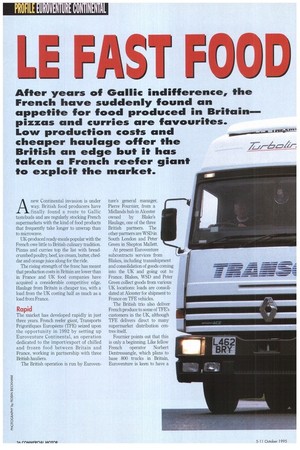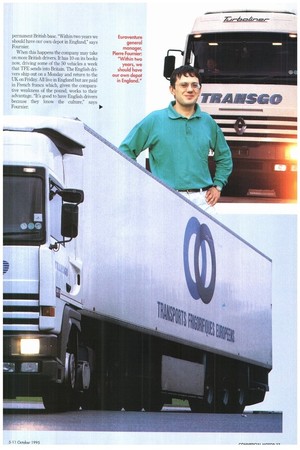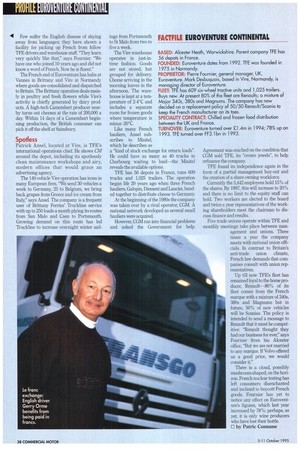FAST FOOD
Page 38

Page 39

Page 40

If you've noticed an error in this article please click here to report it so we can fix it.
After years of Gallic indifference, the French have suddenly found an appetite for food produced in Britainpizzas and curries are favourites.
Low production costs and cheaper haulage offer the British an edge but it has taken a French reefer giant to exploit the market.
Anew Continental invasion is under way. British food producers have finally found a route to Gallic tastebuds and are regularly stocking French supermarkets with the kind of food products that frequently take longer to unwrap than to microwave.
UK-produced ready-meals popular with the French owe little to British culinary tradition. Pizzas and curries top the list with breadcrumbed poultry, beef, ice cream, butter, cheddar and orange juice along for the ride.
The rising strength of the franc has meant that production costs in Britain are lower than in France and UK food companies have acquired a considerable competitive edge. Haulage from Britain is cheaper too, with a load from the UK costing half as much as a load from France.
Rapid
The market has developed rapidly in just three years. French reefer giant, Transports Frigorifiques Europeens (TFE) seized upon the opportunity in 1992 by setting up Euroventure Continental, an operation dedicated to the import/export of chilled and frozen food between Britain and France, working in partnership with three British hauliers.
The British operation is run by Euroven
ture's general manager, Pierre Fournier, from a Midlands hub in Alcester owned by Blake's Haulage, one of the three British partners. The other partners are WSll in South London and Peter Green in Shepton Mallett.
At present Euroventure subcontracts services from Blakes, including transshipment and consolidation of goods coming into the UK and going out to France. Blakes, WSD and Peter Green collect goods from various UK locations: loads are consolidated at Alcester for shipment to France on TFE vehicles.
The British trio also deliver French produce to some of TFE's customers in the UK, although TFE delivers direct to many supermarket distribution centres itself.
Fournier points out that this is only a beginning. Like fellow French operator Norbert Dentressangle, which plans to base 800 trucks in Britain, Euroventure is keen to have a permanent British base. "Within two years we should have our own depot in England," says Fournier, When this happens the company may take on more British drivers. It has 10 on its books no driving some of the 50 vehicles a week that TFE sends into Britain. The English drivers ship out on a Monday and return to the UK on Friday. All live in England but are paid in French francs which, given the comparative weakness of the pound, works to their advantage. "It's good to have English drivers because they know the culture," says Fournier. • Few suffer the English disease of shying away from languages; they have shown a facility for picking up French from fellow TFE drivers and warehouse staff. "They learn very quickly like that," says Fournier. "We have one who joined 10 years ago and did not know a word of French. Now he is fluent."
The French end of Euroventure has hubs at Vannes in Brittany and Vire in Normandy where goods are consolidated and dispatched to Britain. The Brittany operation deals mainly in poultry and fresh flowers while Vire's activity is chiefly generated by dairy products. A high-tech Camembert producer nearby turns out cheeses at the rate of 200,000 a day. Within 14 days of a Camembert beginning production, the British consumer can pick it off the shelf at Sainsbury.
Spotless Patrick Ansel, located at Vire, is TFE's international operations chief. He shows CM around the depot, including its spotlessly clean maintenance workshops and airy, modern offices that would grace an advertising agency
The 140-vehicle Vire operation has irons in many European fires. 'We send 30 vehicles a week to Germany, 25 to Belgium, we bring back grapes from Greece and ice cream from Italy" says Ansel. The company is a frequent user of Brittany Ferries' Trucldine service with up to 250 loads a month plying its routes from San Malo and Caen to Portsmouth. Growing demand on this route has led Truckline to increase overnight winter sail ings from Portsmouth to St Malo from two to five a week.
The Vire warehouse operates in just-intime fashion. Goods are not stored, but grouped for delivery. Cheese arriving in the morning leaves in the afternoon. The warehouse is kept at a temperature of 2-4°C and includes a separate room for frozen goods where temperature is minus -20°C.
Like many French hauliers, Ansel subscribes to Minitel, which he describes as a "kind of stock exchange for return loads". He could have as many as 40 trucks in Cherbourg waiting to load—the Minitel reveals the available options.
TFE has 56 depots in France, runs 609 trucks and 1,025 trailers. The operation began life 20 years ago when three French hauliers, Galopin, Diement and Laucier, banded together to distribute cheese to Germany.
At the beginning of the 1980s the company was taken over by a rival operator, CGM. A national network developed as several small hauliers were acquired.
However, CGM ran into financial problems and asked the Government for help. Agreement was reached on the condition that CGM sold TFE, its "crown jewels", to help refinance the company.
TFE found its independence again in the form of a partial management buy-out and the creation of a share owning workforce.
Currently the 5,442 employees hold 15% of the shares. By 1997, this will increase to 20% and there is no limit to the equity staff can hold. Two workers are elected to the board and twice a year representatives of the working shareholders meet the chairman to discuss finance and results.
Five trade unions operate within TFE and monthly meetings take place between management and unions. Three times a year the company meets with national union officials. In contrast to Britain's anti-trade union climate, French law demands that companies consult with union representatives.
Up till now TFE's fleet has remained loyal to the home producer, Renault-80% of its fleet comes from the French marque with a mixture of 340s, 380s and Magnums but in future, 50% of new vehicles will be Scanias. The policy is intended to send a message to Renault that it must be competitive: "Renault thought they had our business for ever," says Fournier from his Alcester office, "But we are not married to any marque. If Volvo offered us a good price, we would consider it."
There is a cloud, possibly mushroom-shaped, on the horizon. French nuclear testing has left consumers disenchanted and inclined to boycott French goods. Fournier has yet to notice any effect on Euroventure's figures, which last year increased by 78%; perhaps, as yet, it is only wine producers who have lost their bottle.
Li by Patric Cunnane




































































































































